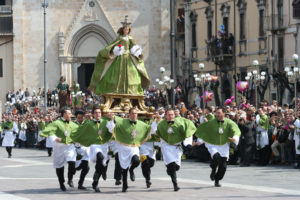
Growing up, my school assemblies would always talk about self-esteem. It seems that elementary schools in the late 80’s and 90’s (sorry for my older readers-I don’t mean to rub it in your face) had this one major issue on their minds. It would seem to be up to the teachers of that decade to instill within students like myself that we are “special.” We have a value and a purpose and we should see that. A common phrase used was, “Can’t we all just get along?” The push for such education can be justified—just as anti-bullying programs are justifiable today. What started as an attempt to boost self-confidence and love of oneself has, in a way, naturally transformed itself into what theologians and philosophers call relativism.
Relativism is the belief that all ideas, opinions, beliefs, etc. hold the same value. It implies that there is no universal truth. (If I’m ok, you’re ok, everything is ok) If I want to believe that 2+2=5, then who are you to tell me otherwise? Obviously that example is a bit extreme, but if we look at some of the issues we face as Catholics today, we can clearly see this philosophy at work. Issues such as the redefinition of marriage, abortion, artificial contraception, embryonic stem cell research, and other hot button topics can be linked to this idea that there is no natural or universal law or truth. The flip side of these issues places the Catholic Church in a position where it may “suffer greatly” (Matthew 16:21) when they stand up for a universal truth.
By constantly hearing “I love me for me” and “It’s ok to be me” many of my generation were led to the next obvious question—Who is this “me” I am supposed to love, or more grammatically correct, “Who am I?” Finding who “me” is for many of my peers and others in my generation meant that they would or could redefine their identity. Even though I grew up in a fairly middle-class suburb in central New Jersey, many of my friends decided that they would fabricate this ideal that we lived in the ghetto. People in my middle and high school claimed to be from the School of Hard Knocks, when in reality they lived in a large house with a maid and a landscaper. Other false identities quickly followed based on what we saw in movies, listened to in music, and what we saw others doing. Was this just typical adolescence? Perhaps—or perhaps because it was coupled with a “find yourself…love yourself…don’t let anyone try and change you” attitude, we are now faced with many other forms of redefinition today.
Through my school assemblies, I was taught that just because someone is different than I am does not give me the right to feel like I am more important or entitled to more than that person. It certainly doesn’t give me the right to hurt or make fun of that person either. This teaching is true and, in fact is rooted in Catholic teaching about the dignity of the human person. In fact as Catholics, we believe in the dignity of all human beings regardless of race, ethnicity, religion, gender, looks, wealth, or sinfulness. Yet when we stand up for what we believe in we are labeled, by some, as old fashioned, haters, bigots, and worse. So how do we as Catholics stand up for truth in a loving way?
Without putting this type of formation in the correct context, there is no wonder why we have allowed the world to form such a thought process which leads to relativism. The Church teaches the fact that we are all created by God with a dignity. We were created by God who is love (1 John 4:8). We were created out of love, for love, and we deserve nothing less than love. So yes we are supposed to respect and love all of God’s creations, including ourselves. Yet God calls us out of ourselves in the Gospels, saying to deny ourselves for the sake of His Kingdom. We are to deny the world and not conform to it (Romans 12:1-2). We must stand up for the universal truth, God’s truth and His law must govern our lives. We may suffer greatly for this in terms of the world. Yet if we do not, the world will suffer greatly. How do we do this? Love. Love till it hurts. Love when it feels like the Lord “duped you.” (Jeremiah 20:7) Love as God loved. Love to death.



